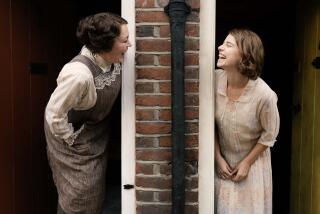Hey, Cameron Crowe -- why don’t you just get back to work?
Before “Aloha” could become a flash point for those upset with Emma Stone playing someone one-quarter Hawaiian, another hard reality was taking shape: Something had gone haywire with Cameron Crowe in the role of comedy filmmaker.
“Aloha” may have had a troubled history, but the overwhelming feeling after seeing it was that the guy who’d developed a signature romantic-comedy blend of rock songs, unfussy sweetness and witty one-liners had somehow lost the recipe and maybe a few senses to boot. Crowe had nobody at “Aloha.”
When comedy directors lose their way, there’s a strange despair behind the absent laughter because comedy is the most unforgiving of genres. When nothing’s working, the sound of not-chuckling is as deafening as the wall-to-wall noise in a senseless action flick.
But a major talent having a fallow creative period — and Crowe is going on 15 years now — is nothing new. In fact, it’s par for the course for those who make comedies, if only because that particular alchemy is one of the hardest to sustain. Where the qualities in drama allow for ebb and flow and changing moods that mirror the human condition, comedy cruelly comes down to data and percentages, whether slapstick farce or a gentle romance: Laugh more often than not, and the movie is good. Unless, of course, it was supposed to be a drama.
Crowe isn’t alone, either, in experiencing a dip in mirthful mojo. Comedy titan James L. Brooks (who produced a pair of Crowe’s legacy-earners, “Say Anything” and “Jerry Maguire”) wrote and directed two beautifully bittersweet, superbly acted epics of relationship neurosis in “Terms of Endearment” and “Broadcast News.” In the 1980s. His two most recent, 2004’s “Spanglish” and 2010’s “How Do You Know,” were flops, forced and leaden.
Judd Apatow’s first two films as director — the charmingly irreverent “The 40-Year-Old Virgin” and “Knocked Up” — met with rapturous notices and box office, but the next two were the lesser-seen and less-heralded “Funny People” and “This Is 40.” (Word has been positive, however, about his newest, “Trainwreck,” due next month.)
What marks a slump these days, though, is less the number of “off” films than the time frame in which they exist. As their movie careers blossomed, Crowe, Brooks and Apatow took longer between projects. If the best cure for a bad joke is a good one right after it — a modus operandi that stand-up comedians live and breathe by — the same theory should apply for someone in the funny-movie business.
Brooks, of all people, is aware of this keep-plugging-away ethos, coming from television, where he’s made some of the greatest situation comedies of all time, insightful classics that generated laughter weekly. A single iffy episode of his “The Mary Tyler Moore Show” (I know, I know, there weren’t any, it’s a hypothetical) or “Taxi” would be immediately negated by the lure of a new one next week. But waiting seven years after “Spanglish” just to get “How Do You Know”? Who can meet expectations after that pregnant a pause? You know who gets to make us wait? George Miller (“Mad Max: Fury Road”). He had to corral an army to manifest a 100-mile-an-hour desert apocalypse. Brooks films humans talking in rooms.
Woody Allen gets it. Two bad films in a row for this auteur workhorse is nothing, coughs between arias. Who even remembers subsequent groaners “Whatever Works” and “You Will Meet a Tall Dark Stranger” or “The Curse of the Jade Scorpion” and “Hollywood Ending”? Allen just keeps you hoping the just-around-the-corner release, and the one he’s shooting now, and the one he’s thinking about, will be like the last ones you cheered over (“Midnight in Paris” and “Blue Jasmine”). It’s almost like a shell game. He moves fast, you might lose your money more often than not, but the occasional flash of success keeps you invested. Discouraged about the lackluster response this year at Cannes for “An Irrational Man”? Hey, isn’t he doing a series for Amazon?
Celebrated film satirist Paul Mazursky had a similar schedule after hitting big with “Bob & Carol & Ted & Alice” in 1969: one every two years, almost like clockwork. It was a discipline that gave us a richly funny “Next Stop, Greenwich Village,” “An Unmarried Woman,” “Down and Out in Beverly Hills” and “Enemies, A Love Story” more often than it produced a forgettable “Moon Over Parador” or “The Pickle.”
The legendary Billy Wilder — Crowe’s acknowledged idol — may have the best one-a-year track record in comedy history, aided by a studio system that fostered productivity. For Wilder, “The Seven Year Itch” was a title, not a state of fan anticipation. That he produced “Some Like It Hot,” “The Apartment” and “One, Two, Three” in a three-year stretch is as incredible as Preston Sturges’ 1940 to 1944 gusher of feverish, memorable farces. But when Wilder’s routine hiccuped regularly in the 1960s, he lost that explosive snap in his barbed approach. Sure, a reasonable historian might argue that his merciless brand of suggestively dirty wit lost its power once movies became more explicitly adult. I blame the slacking off.
Comedy director slumps are correctable, but it means getting back on the horse. It’s a message Noah Baumbach seems to have gotten: This year he’ll have two breezy indie comedies in theaters: “While We’re Young” and “Mistress America.” All Crowe has to do, then, is write something quickly, trust his instincts, find some actors (maybe not Emma Stone for the time being) and get it on its feet. Get away from studios — and their hacking issues — if he has to. Crowe will complete us again, but will Woody have tried to complete us five more times by then?
More to Read
Only good movies
Get the Indie Focus newsletter, Mark Olsen's weekly guide to the world of cinema.
You may occasionally receive promotional content from the Los Angeles Times.






